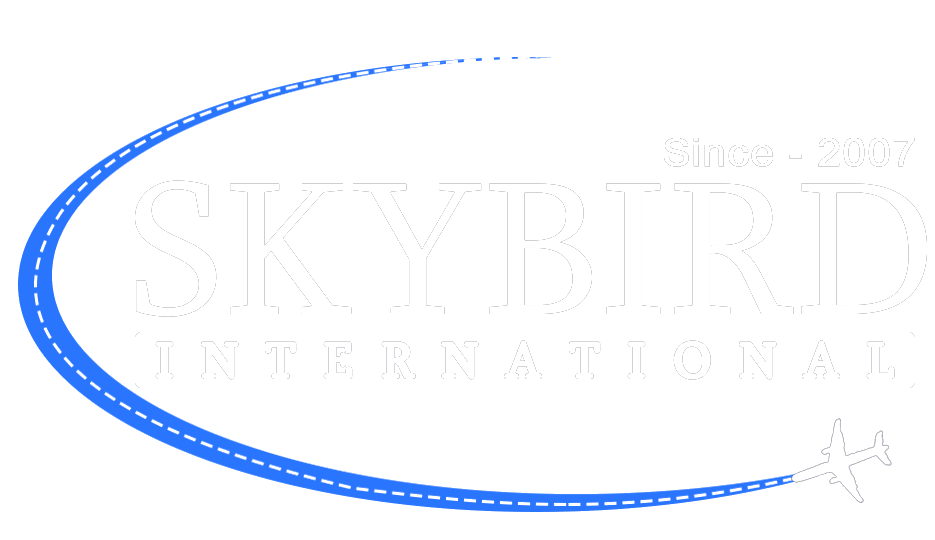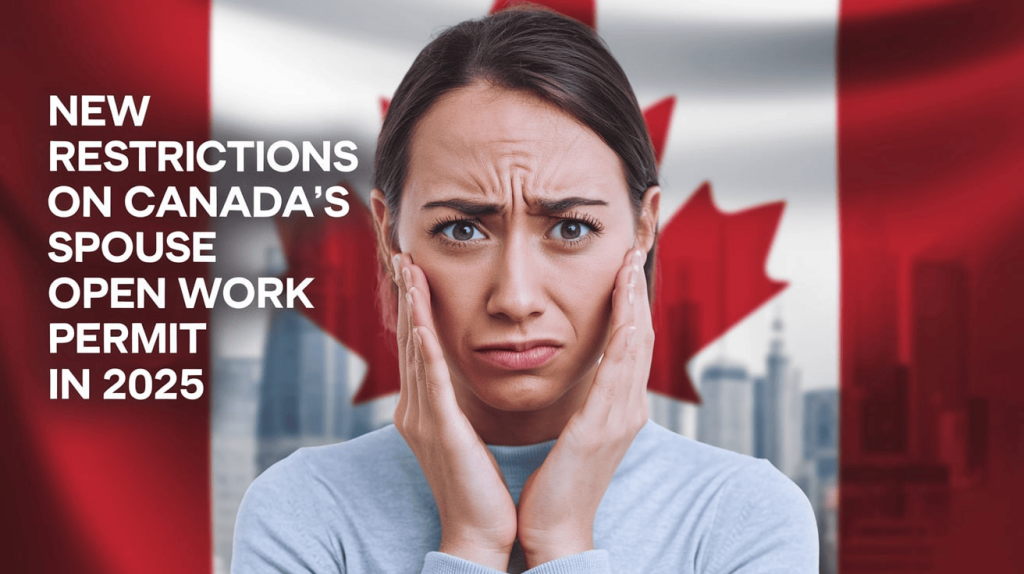Did you know that Canada recently tightened its rules for Open Work Permits (OWPs) for spouses of international students and foreign workers? Effective January 21, 2025, these changes significantly impact who is eligible to work in Canada while their partner studies or works. Open Work Permits are crucial for families, allowing spouses to contribute to the Canadian economy while providing much-needed emotional and practical support to their partners.
So, stay tuned with ‘Skybird International’ to learn how these new restrictions may impact international students and their families in Canada Immigration 2025!
What Are Open Work Permits (OWPs)?
An Open Work Permit (OWP) allows individuals to work for any employer in Canada. It also permits them to work in most industries without needing a specific job offer or Labor Market Impact Assessment (LMIA). This flexibility makes OWPs highly desirable compared to employer-specific work permits. OWPs for spouses of international aspirants or foreign workers allow them to live and work in Canada for the duration of the primary permit holder’s stay.
Key Changes to Family Open Work Permits in 2025
From January 21, 2025, several significant restrictions will apply to family OWPs for spouses of international students and foreign workers. These changes are part of the Canadian government’s wider efforts to manage temporary residency and address housing and affordability concerns.
Family Open Work Permits for International Students
The new Canada spouse permit updates regarding family OWPs for international students will limit eligibility to spouses of students enrolled in certain academic programs. Specifically, the new restrictions will apply to:
- Master’s programs that are 16 months or longer
- Doctoral programs
- Select professional & eligible programs, including:
- Doctor of Dental Surgery (DDS)
- Doctor of Medicine (MD)
- Doctor of Optometry (OD)
- Doctor of Veterinary Medicine (DVM)
- Pharmacy (PharmD, BS, BPharm)
- Bachelor of Law (LLB, JD, BCL)
- Bachelor of Science in Nursing (BScN, BSN)
- Bachelor of Nursing Science (BNSc)
- Bachelor of Nursing (BN)
- Bachelor of Education (BEd)
- Bachelor of Engineering (BEng, BE, BASc)
Previously, there was no requirement for the master’s program to be 16 months or longer for the spouse to qualify for a family OWP. Now, only those enrolled in longer master’s programs or the above-listed professional programs will be eligible.
Family Open Work Permits for Foreign Workers
Family OWPs for foreign workers will also face tight restrictions. Under the new rules, the eligible candidates can only qualify for an OWP if their partner is working in specific occupations. These include:
- Training Education Experience and Responsibilities (TEER) 0 occupations such as management roles.
- TEER 1 occupations (high-skill jobs).
- Select TEER 2 or 3 occupations in:
- Natural & applied sciences
- Construction
- Healthcare
- Natural resources
- Education
- Sports
- Military sectors
A full list of eligible TEER 2 & 3 occupations by Immigration, Refugees, and Citizenship Canada (IRCC) was published by IRCC on January 21, 2025 at: https://www.canada.ca/en/immigration-refugees-citizenship/services/immigrate-canada/find-national-occupation-code.html.
Important Eligibility Condition
For spouses of foreign workers to be eligible for a family OWP, the worker must have at least 16 months remaining on their work permit when their spouse applies. Furthermore, dependent children of foreign workers will no longer be eligible for family OWPs under the Canada Spouse Work Permit Changes 2025.
Who is Not Affected by These Changes?
Not all candidates will be impacted by these 2025 restrictions. The following groups are exempt:
- Eligible partners covered by Free Trade Agreements (FTAs): Those from countries with trade agreements with Canada may continue to apply for OWPs without restrictions.
- Spouses of individuals who are being sponsored for permanent residence: If a spouse is already legally residing in Canada, they may still apply for a Spousal Open Work Permit (SOWP). This applies even if the new rules are in effect and they are being sponsored for permanent residence.
Can Family Open Work Permits be Renewed?
Family OWPs that were issued under previous regulations and are still valid will continue to remain effective even after January 2025. However, if the OWP holder wants to renew their permit, they can apply for a renewal. The renewal duration must match the remaining validity of the sponsor’s study or work permit.
Why Is Canada Making These Changes?
The Canadian government is introducing these new Canadian spouse work permit restrictions as part of a broader set of measures. It aims at reducing the number of temporary residents in the country. The nation is trying to combat issues related to housing supply and affordability. To achieve this, they are limiting the number of family members who can accompany international students and foreign workers on open work permits.
At a press conference announcing these changes, Immigration Minister Marc Miller noted that these restrictions could result in 50,000 fewer permits issued for the spouses of international students. Additionally, up to 100,000 fewer permits may be issued for the spouses of foreign workers over the next 3 years. These measures are also tied to the overall reduction in the number of Temporary Foreign Worker Program (TFWP) and International Mobility Program (IMP) work permits.
What Are the New Immigration Targets?
As per the new work permit updates, the Canadian immigration authorities have set specific targets for the number of work permit holders. These numbers are expected to land in Canada through the Temporary Foreign Worker Program and International Mobility Program. The following are the target numbers:
Work Permit Type | 2025 | 2026 | 2027 |
IMP (International Mobility Program) | 285,750 | 128,700 | 155,700 |
TFWP (Temporary Foreign Worker Program) | 82,000 | 82,000 | 82,000 |
Total | 367,750 | 210,700 | 237,700 |
These targets reflect a significant reduction in the number of work permits available under the IMP. This includes family OWPs, as the Canadian government continues to focus on addressing housing and affordability concerns. Immigration regulations can be complex and ever-changing. Consulting experts like ‘Skybird International’ ensure that applicants are aware of the latest policies and prepared to make informed decisions
Potential Concerns and Solutions
Concern: What if my program doesn’t meet the eligibility requirements?
Solution: Consider choosing eligible programs or consulting with immigration experts for alternative pathways.
Concern: Will these changes affect permanent residency applications?
Solution: Spouses can still explore PR pathways, such as sponsorship programs or Express Entry, irrespective of family OWP restrictions.
Alternative Pathways for Spouses
With the new restrictions on Canada’s Spouse Open Work Permit (OWP) coming into effect on January 21, 2025, spouses of international students and foreign workers may face eligibility challenges. However, alternative pathways are available to ensure they can still pursue their goal of living and working in Canada. The following alternatives may help:
Provincial Nominee Programs (PNPs)
Provincial Nominee Programs allow provinces and territories in Canada to nominate individuals for permanent residency based on specific economic and labour market needs. Spouses can explore PNP streams designed for skilled workers, international graduates, or specific occupations in demand.
Some PNPs may have family-friendly provisions, making it a viable pathway for spouses to secure work and apply for PR.
Employer-Specific Work Permits
Unlike Open Work Permits, employer-specific work permits are tied to a particular employer and job. Spouses can find an employer willing to sponsor their work permit through a valid job offer. This pathway may require a Labor Market Impact Assessment (LMIA) to demonstrate that hiring a foreign worker will not negatively impact the Canadian labour market.
Permanent Residency Pathways (Express Entry)
Spouses can explore Canada’s Express Entry system, which includes the following programs:
- Federal Skilled Worker Program (FSWP)
- Federal Skilled Trades Program (FSTP)
- Canadian Experience Class (CEC)
By creating an Express Entry profile, spouses can accumulate points under the Comprehensive Ranking System (CRS) based on factors such as education, language skills, and work experience. Being the principal applicant or supporting the primary applicant’s profile can increase their chances of securing an Invitation to Apply (ITA) for PR.
Bridging Open Work Permits (BOWPs)
If the principal applicant (spouse or partner) has already applied for permanent residency and their work permit is nearing expiry, they may be eligible for a Bridging Open Work Permit (BOWP). This permit allows the spouse to continue working in Canada while awaiting a decision on their PR application.
Some Additional Options to Explore
- Student Visas: Spouses can choose to pursue education in Canada by enrolling in eligible academic programs. This not only provides an opportunity for career advancement but may also open pathways to work permits or PR upon graduation.
- PR Sponsorship: Spouses can still explore permanent residency sponsorship pathways if their partner is already a PR or citizen in Canada.
To wrap up, the new Canadian spouse work permit restrictions on family Open Work Permits in Canada, effective January 21, 2025. This will significantly impact the spouses of international students and foreign workers. It is important for those planning to move to Canada under these programs to understand the eligibility changes and prepare accordingly.
These alterations are part of Canada’s broader strategy to address the challenges of housing affordability. Also, ensure that immigration programs align with the country’s long-term economic goals. As the government adjusts its immigration policies, applicants and their families need to stay informed.
For more updates, keep in touch with visa consultants at ‘Skybird International’!


